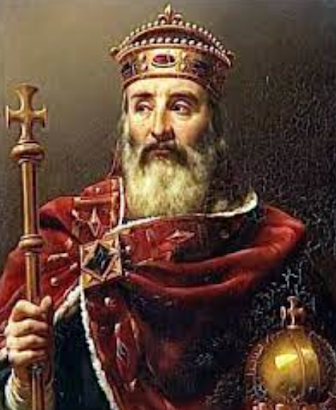Charlemagne (748 – 814) was the son of Pepin the Short, King of the Franks, and Queen Bertrade of Laon. Charlemagne was born in eastern Frankland, in the district that is called Moingewi, and it was the monastery of Fulda, in the school of Saint Boniface the Martyr, that his b0yhood received its first training.
Along with the legendary King Arthur and the crusading conqueror of Jerusalem, Godefroy of Bouillon, Charlemagne was one of the three secular 'chivalric' Worthies of the later Middle Ages.
Pepin the Short died in 768. He left a greatly strengthened Frankish kingdom to his two sons, Carloman and Charles. After Carloman’s death in 771, Charles, who was known as Charlemagne, or Charles the Great, ruled the kingdom.
He promoted Christianity, education and learning. He was crowned emperor by the pope on Christmas Day 800, and provided thereby both the essential ideological potential for subsequent imperial ambitions among the medieval and early modern rulers of western Europe and a link between the ‘germanic’ and Roman political worlds.
Charlemagne built an empire greater than any known since ancient Rome. Each summer he led his armies against enemies that surrounded his kingdom. His kingdom was flanked on the east by newly formed entities of Croatia and in the west by the buffer zone represented by the March of Barcelona (modern-day Catalonia).
He fought Muslims in Spain and tribes from other Germanic kingdoms. He conquered new lands to both the south and the east. Through these conquests, Charlemagne spread Christianity. He reunited western Europe for the first time since the Roman Empire. By 800, Charlemagne’s empire was larger than the Byzantine Empire.
He died on January 28th, 814 AD. A year before Charlemagne died in 814, he crowned his only surviving son, Louis the Pious, as emperor.
Charlemagne: Charles the Great
The Auspicious Incident and the End of the Janissaries
-
The *Auspicious Incident* (*Vaka-i Hayriye*) refers to the dramatic
destruction of the Ottoman Janissary corps by Sultan Mahmud II on June 15,
1826. Thou...




